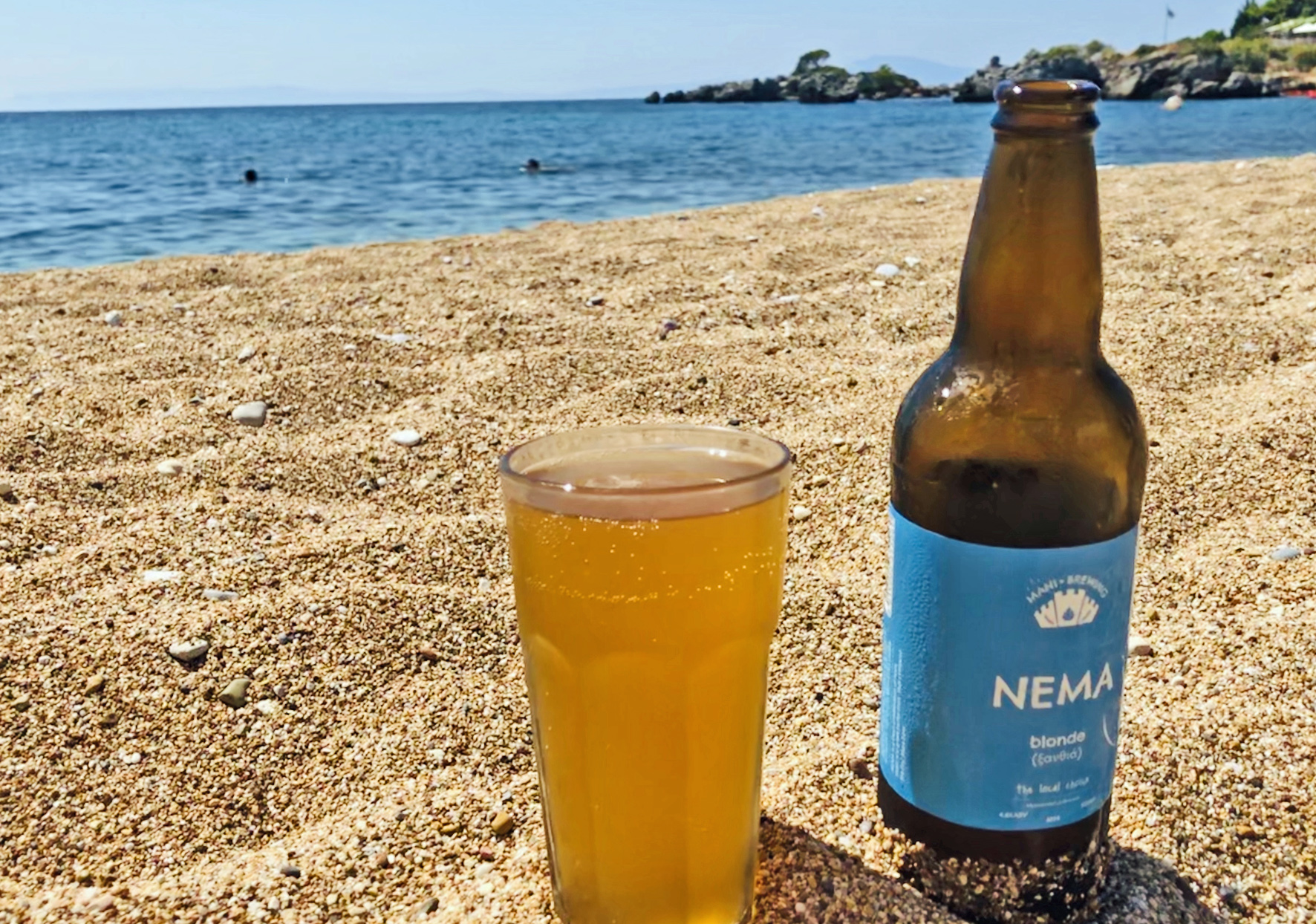I’ve been going on holiday with my family to the Mani, in the middle “finger” of the Peloponnese, pretty regularly since 2006: it’s a beautiful, almost entirely unspoilt place, the beaches are broad and sandy, the sun almost continuous, the people are friendly, the food is excellent, locally sourced and cheap. The beer, until now, has generally not been up to much, but when it’s 32ºC almost anything cold and wet will do. All the same, I was thrilled to discover this year that a local entrepreneur, Takis Kapetanéas, has opened a craft brewery on the edge of the small fishing village of Agios Nikolaos, in the Western Mani, just five minutes down the road from the seaside village of Stoupa, where we always stay.
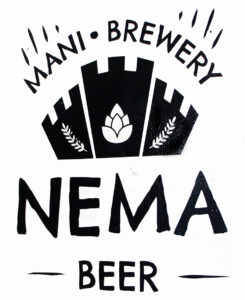
Greece now has 45 breweries, up from 35 two years ago, 13 in 2009 and a mere five at the start of the century. Most are still tiny, however (indeed, the Mani Brewery, despite being one of the newest is the second-largest “craft” beer brewery in the country), some have struggled and closed, such as the Messinian brewery, near Kalamata, opened in 2009, which made beer under the similar-sounding Neda brand, but which closed a couple of years or so back; and beer remains down the list of priorities for Greek drinkers: for comparison, the country is said to have some 500 different brands of ouzo, and 3,500 wines.

The brewery’s founder, Takis (short for Panagiotis) is in his early 40s and proudly Maniot born and bred: the “-éas” at the end of his family name is the universal ending for surnames in the Messinian Mani, and the brand name of his beers Nema, is a Maniot dialect word meaning “gesture” or “nod”, while the brewery logo features the tower houses found in almost every Maniot village, where, in the past, families would retreat to defend themselves against their enemies – generally rival families from the same village.
Takis, who worked in the property business before he became a full-time brewery owner, says he “fell in love” with beer on his travels abroad, and became a “long-time” home brewer, always with the ambition to open his own brewery. The brews currently being made at the Mani Brewery, a 16 IBU 4.6 per cent abv blonde ale and a 20 IBU, 4.6 per cent abv summer ale, are “pragmatic” beers, Takis says: not the beers he would like to make which would be well-hopped IPAs and stouts, but the ones he knows will sell in the Greek market, where 99.5 per cent of the beer on sale is pale euro-lager.
The blonde is an excellent, refreshing, unfiltered, unpasteurised easy-drinking top-fermented ale, best served well-chilled: citrussy, slightly sweet, made with the local spring water, treated as necessary (Mani tap water is unfit for drinking, containing four times more fluoride than EU recommendations, but the springs in the region provide nicely lime-hard brewing liquor), Magnum hops, Greek pils malt from the Vergina brewery in Thessaly and a touch of Vienna and carapils,. It’s a great beach or poolside beer. The summer ale, paler, slightly bitterer, slightly hoppier, is a little more complex, and a fine companion for the generally unfussy, excellent-value Greek food, all made from local ingredients, found in the many family-run restaurants in Ag Nik and its larger neighbours, Stoupa and Kardamili, where you can still dine very well for under €14 a head, including drink.
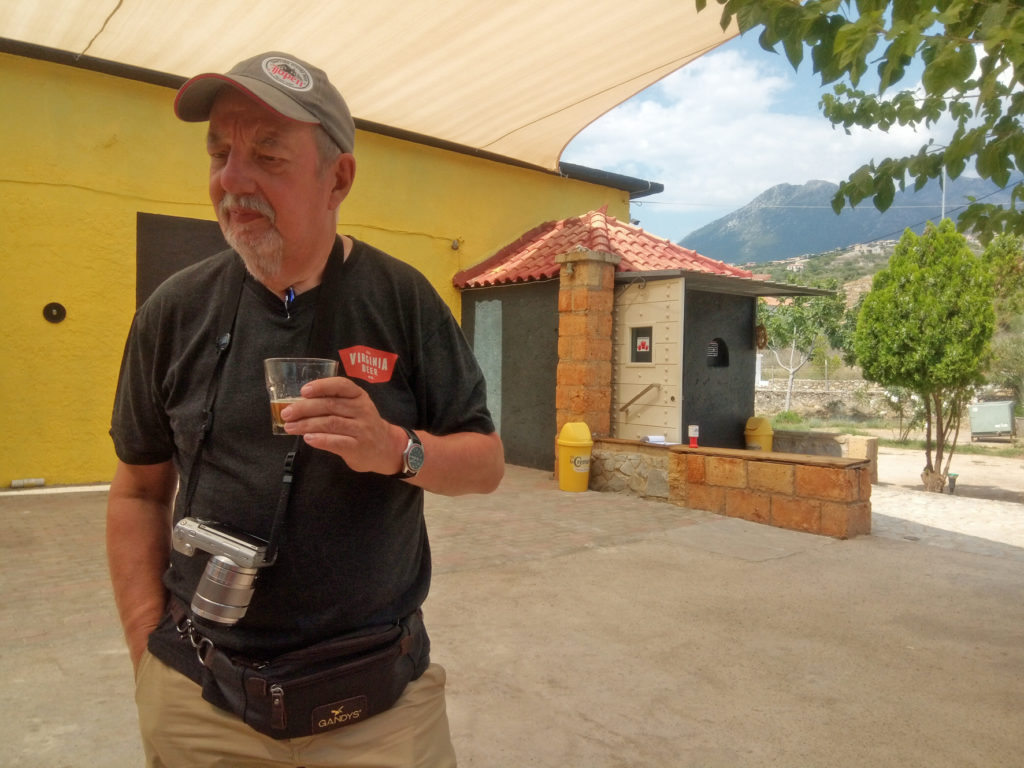
Takis and John Malcolm, an expat Scot in his 60s and another long-term home brewer who met Takis through their mutual interest in making beer, and who is now one of two assistants at the three-man brewery, offered a sample of the blonde ale that had been souped up post-fermentation with masses of extra Citra hops, a beer closer to the sorts they would like to educate local drinkers into appreciating. It was tremendous: the pale malts giving an almost transparent underpinning, like clear glass struts, to a beautifully sculpted structure of lemons, limes and mangoes whirled together in a frothy, scented, just-bitter-enough delight.
The brewery itself, which opened in June last year just off the main road south from Stoupa, between the mountains and the sea, after a short period where Nema beers were being made by the Sparta brewery, on the other side of the Taygetus mountains that divide the Mani peninsula, is housed in a building that started as an olive oil factory, spent some time as a marble works and was later a disco, which has to be, surely, one of the most varied careers of any brewery premises on the planet. Today it holds shiny Chinese-made stainless steel brewing kit: 1,200-litre brew length, mash tun, copper, lauter tun, whirlpool and hop kettle, four fermenting vessels (three 25hl, one 12.5hl), pumps and valves computer-operated, it only brews top-fermented, unfiltered, unpasteurised ales, so no lagering tanks, and there is a very small bottling and kegging line, with CO2 flushing. The kit was manufactured by Tiantai, in Jinan, Shandong, China to Takis’s specifications, and Tiantai send its Mr Wu over to Greece to put it all together: according to John Malcolm, Mr Wu did not speak English, let alone Greek, and all communication with him was via Google Translate. How much the kit actually cost, the Mani Brewery won’t say (indeed, they were rather upset when I made a guess), although John Malcolm did reveal that it cost more to ship the kit from Piraeus, Greece’s main port, to Ag Nik than it did to get it from China to Piraeus.
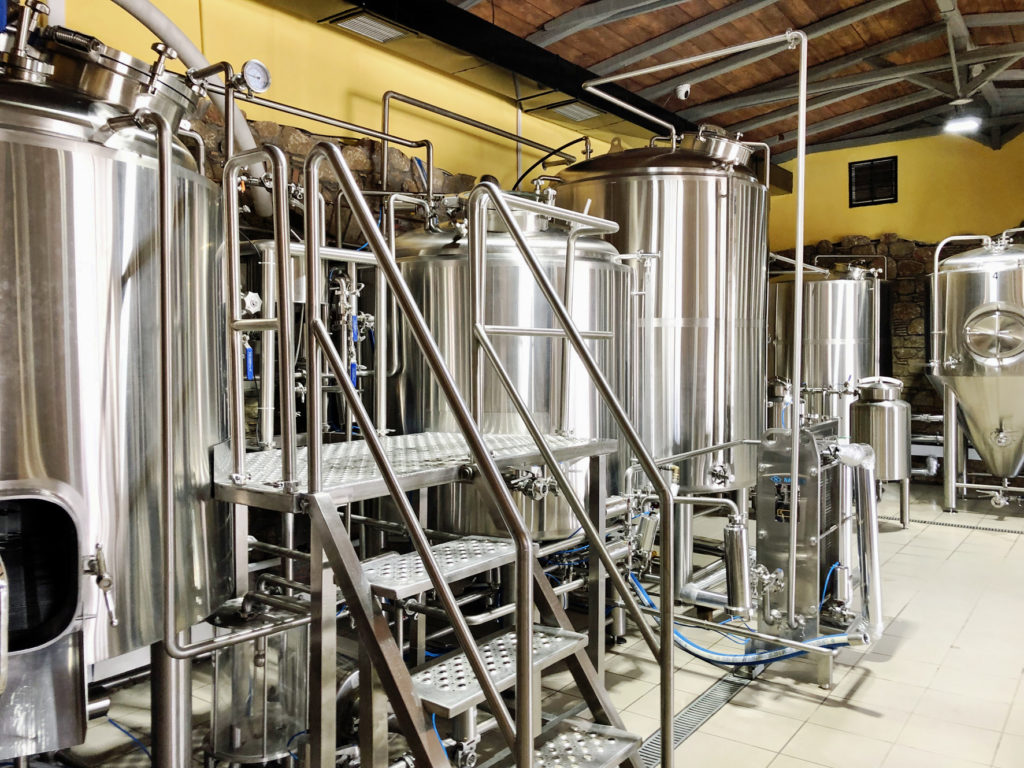
Takis is coy about the whole source of the brewery’s funding, saying only that it is “local financing”. He has backing from a big local drinks distributor, and he has also had encouragement from Mythos Brewery, the Carlsberg subsidiary that supplies what is probably the best of Greece’s macro-lagers. The encouragement from Mythos, he thinks, is there because the company sees an operation like the Mani Brewery as expanding the market for beer in Greece, and Carlsberg would like to be able to introduce some of its more “craft” brands, such as Grimbergen (yes, I know, but that’s how Carlsberg sees it) into the country. The reasoning seems to be that if, through the availability of more craft beer from the likes of the Mani Brewery, the Greeks are persuaded to drink more unusual beers and less macro-lager and ouzo, then this will be good for Carlsberg as well.
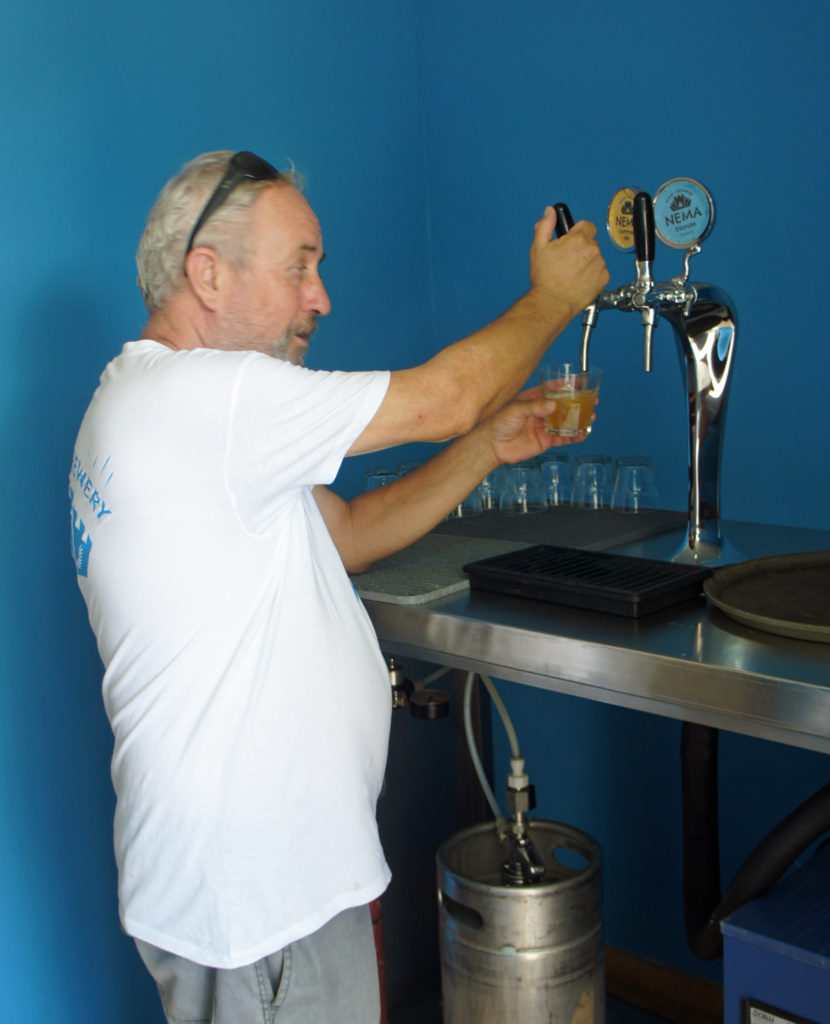
It’s a brave step to push unfiltered, unpasteurised, slightly hazy ales at a market that doesn’t really understand such beers yet, and once, at least, in my multiple samplings of Mani Brewery beers in numerous outlets over more than a fortnight it didn’t work – ironically, at a restaurant in Ag Nik itself, where the beer in two consecutive bottles was clearly badly oxidised. That was the only hiccup, however, and I report it solely in the interests of honesty. Otherwise, if you’re in Greece, Nema beers are worth grabbing wherever you see them. The beers of the Mani Brewery are available, on draught and/or in bottle, in almost every outlet in the region, and pushing up into Kalamata, the local big city. I greatly look forward to sampling them again, and seeing what new brews Takis, John and the rest of the team come up with.
The original version of this post contained a story that I was told by two different people, which Heineken Greece insists is totally false. It was alleged to me that after the Mani Brewery opened, Heineken Athens, brewer of leading brands of beer in Greece such as Alfa and Amstel, contacted all the local bars, restaurants and supermarkets and told them that if they started stocking the new brewery’s beers, Heineken would withdraw its own brands, plus the dispense equipment, from their premises. “Fine,” all the bar owners allegedly replied, to a Maniot. “Do you want to come and collect it now, or shall we just throw it out into the street?”
It appeared a fine example of how you should never try to bully a Maniot – they are descendants of the Spartans, and fought the Ottoman Empire for more than 350 years, eventually leading the revolt starting in 1821 that finally saw the Greeks re-establish their independence – and Heineken, unfortunately, has form: it was fined a whopping €31.45 million only five years ago (reduced on appeal to €26.73 million) by Greece’s Competition Commission for abusing its dominant position in the country’s beer market. However, the Mani Brewery was swift to distance itself as far as possible from the story, and after I contacted Heineken for a statement, Yiannis Georgakellos, communications and corporate affairs director at Athenian Brewery, Heineken’s Greek subsidiary, insisted: “The allegation that ‘Heineken Greece contacted bars and restaurants in the local area and told them that if they stocked the new brewery’s beers, Heineken would withdraw its own brands and dispense equipment from their premises’ is simply untrue.
“Over the last five years the number of local microbrewery brands available in the market has drastically increased. This is a positive shift for us, as it gives consumers more options, thus contributing to a thriving beer culture in Greece, which is one of our main objectives as well.”
I am happy to repeat Mr Georgakellos’s assurances that the story is false, and should anybody tell you this story, Mr Georgakellos wants everybody to know that Heineken subscribes to something called Speak Up, “a service available to anyone, internally and externally, who wishes to raise a concern about possible misconduct within our company. We encourage everyone to Speak Up in confidence and without fear of retaliation about any concerns they may have. We offer several Speak Up channels such as speakup.heineken.com through which people can raise questions and concerns. They include trusted representatives and an external Speak Up service (telephone and online) which is run by an independent third party and available 24/7, 365 days a year.”
That’s good to know.
